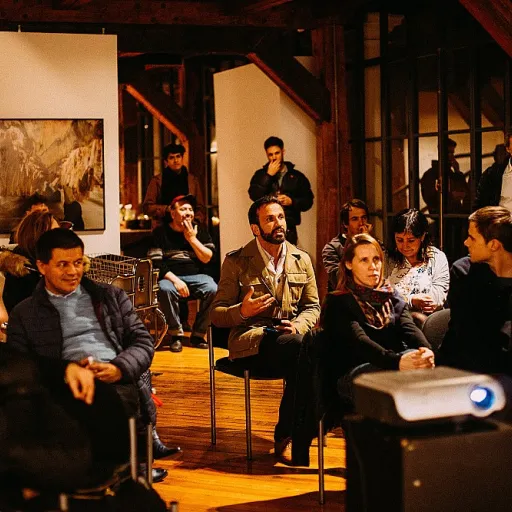
The Role of the Aspire Center in HR Innovation
The Transformative Role of Central Hubs in HR
The Aspire Center for Workforce Innovation stands as a tangible representation of transformation within the field of human resources. Located strategically in the vibrant neighborhoods of Chicago, this center aims to bring a fresh approach to workforce development. By acting as a community cornerstone, the center provides opportunities for Austin residents and the broader Chicago community to access a range of services programmed to enhance workforce capabilities.
This initiative isn't just about offering training and development to local residents; it's about building a resilient workforce that meets the demands of the ever-evolving job market. Such centers act as catalysts for change by integrating workforce training with the needs of local industries around the city of Chicago. Through collaborations, like the Johnson Collaborative and the Austin Coming Together efforts, the Aspire Center prioritizes the improvement of quality life via job creation and skills enhancement.
The role of such hubs extends beyond practical training. They foster a sense of community and collaboration while leveraging existing resources to provide comprehensive support to its participants. BMO Harris and other stakeholders play a crucial role in sustaining these efforts, ensuring that both short-term projects and long-term workforce innovation goals are met. This alignment is essential for nurturing a culture of continuous learning and adaptation, a key focus in current HR transformation strategies.
Explore more about the innovative approaches taken by similar centers and the impact they have on reshaping modern workforces.
Technological Advancements in HR
Driving HR Transformation with Advanced Technology
The Aspire Center is a cornerstone for workforce innovation, actively engaging the Austin community and beyond. Leveraging advanced technology is a crucial component in this journey, aimed at reshaping the landscape of human resources. The integration of cutting-edge technology within the center supports a broad range of initiatives, from workforce development to community support projects. Residents and businesses alike benefit from the impactful services offered, enhancing the city's quality of life. Among notable advancements is the use of data analytics in HR. The Aspire Center empowers organizations to make informed, data-driven decisions that impact their workforce positively. This move towards a more analytical approach significantly influences project outcomes and workforce strategies. Furthermore, the Aspire Center's focus on technology aligns with the larger vision of fostering a connected, innovative environment. This alignment is seen across the board, from the high-tech solutions employed to the collaboration with the city of Chicago and other health authorities to support wider community health initiatives. For those looking to deepen their understanding of these advancements, exploring how a CMS-powered intranet enhances HR operations is highly recommended. This approach facilitates seamless communication and supports ongoing development within the HR field.Fostering a Culture of Continuous Learning
Empowering a Community of Learners
The Aspire Center for Workforce Innovation places a significant emphasis on fostering a culture of continuous learning within the Austin community. As the executive director emphasized, enhancing workforce development has to go beyond mere training; it's about building a dynamic environment where Austin residents can thrive. The center offers a wide range of services, from hands-on training to advanced workforce development programs. Every initiative is crafted to support lifelong learning, ensuring that community members are well-equipped to navigate the ever-evolving job market and enhance the quality of life within the Chicago community. One of the hallmark initiatives at the Aspire Center is its collaboration with the John Collaborative and the neighborhood's high engagement in building educational projects. This emphasis on collaboration ensures that the training offered meets the diverse needs of the Austin community. Moreover, the Aspire initiative promotes the value of continuous learning through partnerships with local organizations, aligning with the broader goals of the Westside Health Authority and other neighborhood institutions. The center functions not just as a space for workforce training, but as a hub of knowledge and innovation, energizing Austin residents to explore new career paths. By unleashing potential, the Aspire Center fosters a learning culture that drives not only personal growth but also community resilience. This approach aligns with the broader trend of applying technological advancements in HR, as discussed in the initial sections. For a comprehensive view of these trends, explore how a strong culture of community in Human Resources is built and maintained, enhancing organizational growth and sustainability.Diversity and Inclusion Initiatives
Celebrating Diversity and Inclusion
The Aspire Center for Workforce Innovation is at the forefront of pioneering diversity and inclusion initiatives. Emphasizing a holistic approach, the center recognizes the value of having a workforce that mirrors the rich tapestry of communities such as Austin and Chicago. This focus is not just a key part of their mission, but a cornerstone of enhancing workforce development and innovation.
In the collaborative space of the Aspire community, the active promotion of diversity is more than a talking point—it's a project in motion. By ensuring that individuals from various backgrounds have equitable access to employment and training opportunities, the center facilitates a workforce that is as dynamic as it is inclusive. This approach supports a range of residents and neighborhoods by offering tailored services and workforce training programs designed specifically to break down barriers.
An integral part of the Aspire initiative is its commitment to building an inclusive city like Chicago. Partnering with organizations, both locally on the Westside and broader groups like a health authority, the center leverages diverse perspectives to foster a culture of respect and mutual understanding. This initiative is supported by a dedicated board of directors and an executive director who champions the cause.
By supporting projects like the one at Emmet Elementary, which encourage community engagement, the Aspire Center for Workforce Innovation isn't just improving the quality of life for Austin residents, but is fostering a thriving environment for all. This alignment with high-quality standards ensures that workforce innovation remains responsive and relevant to the needs of the city of Chicago and beyond.
Data-Driven Decision Making in HR
Utilizing Data for Strategic Decisions in HR
In today’s rapidly evolving business climate, data-driven decision making has become a critical component of workforce innovation. The Aspire Center plays a pivotal role in equipping organizations within the Austin community, as well as beyond, with the insights necessary to make informed human resources decisions. By leveraging data analytics, companies can optimize their workforce management strategies to improve both efficiency and employee satisfaction.
At the heart of this initiative is the focus on building a robust data framework that can support emerging projects. This enables companies to harness real-time insights into employee performance, development needs, and productivity levels. Such a framework is instrumental in enhancing the services offered by organizations, ultimately aiming to boost the quality of life for all employees.
The integration of advanced technologies within the center's operations contributes to a seamless collection and interpretation of data. By doing so, businesses in the Chicago community and beyond can align their workforce strategies with broader industry trends and standards. The board of directors at the Aspire Center emphasizes the importance of data as a tool for fostering not only organizational growth but also employee well-being.
Community leaders and workforce development experts recognize the significant benefits that data-driven methodologies bring to workforce innovation. Executives from the Austin community have been particularly vocal about the role of data in shaping a more equitable and efficient human resources environment. This effort is further supported by collaborative engagements with institutions such as the Westside Health Authority and Johnson Collaborative, which are vested in advancing community health and employment quality.
In summary, the Aspire Center's commitment to integrating data-driven strategies in HR underscores its position as a trailblazer in workforce innovation. By focusing on data insights, austin residents and businesses are given the tools to adapt to evolving industry dynamics, ensuring long-term success and sustainability in the workplace.
Future Trends in Workforce Innovation
Envisioning Tomorrow's HR Landscape
In the constantly evolving realm of workforce innovation, recognizing and predicting future trends is essential. The Aspire Center for Workforce Innovation, located within the vibrant Chicago community, serves as a nexus for such forward-thinking strategies. By examining the successes seen in fostering a culture of continuous learning and promoting diversity and inclusion, we gain insights into the potential direction for human resources development. The integration of technology into human resources continues to transform how services are delivered. With the support of infrastructure projects and initiatives like those in the Austin community, organizations are prioritizing the building of adaptive and resilient workforce models. Emphasizing technological advancements ensures that both the Austin center and the broader community are equipped for any future challenges. Key developments in the field include:- Advanced Data Analytics: Utilizing data-driven insights plays a crucial role in shaping decision-making processes. As seen in many Westside Health Authority initiatives, leveraging data is becoming a cornerstone in workforce training.
- Flexibility and Remote Work Models: With the rise of digital connectivity, organizations are increasingly adopting hybrid workspaces, akin to what the Aspire Center offers.
- Well-being and Mental Health Focus: Protecting the mental health of Austin residents becomes central to ensuring workforce resilience. Initiatives spotlighted at Emmet Elementary emphasize the significance of this aspect.













